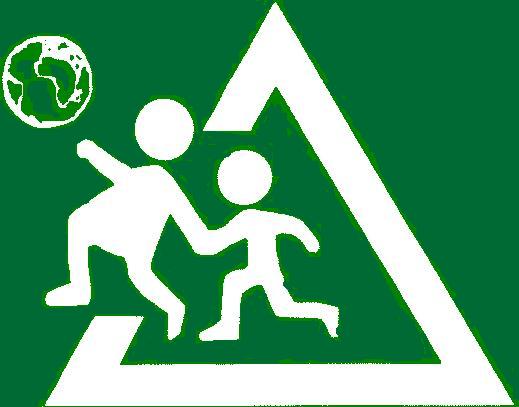|
Play Wise
Partnerships
Play-Wise:
Cooperating with Children to achieve the
Play they want
Children
take the lead in deciding about
their play needs and environments
The
last 40 years have seen a catastrophic
decline in play opportunities for
children. Fair Play has
shown elsewhere that much of this can
be ascribed to the taking of up to 3/4
million acres of residential street
space where they used to play - taken
by the adult motorist, and the main
culprit is the parked car.
Also we have shown that there is about
1 acre of playground in England for
about 700 children, and that to bring
it even to 1 acre per 100, that would
require around 80,000 acres of open
land in the places where mostly they
live. In the past few
years, orgainsed children's play
budgets have been hit harder than,
e.g. main council expenditure or adult
leisure.
In 1931,
there were around 11 million children
in England and Wales. The
numbers peaked in the 1970s, now they
are at 11 million again, and predicted
to rise to over 13 million by
2025. Clearly, the
children of today do not have the open
space freely to play as their healthy
development demands. With
added factors such as parental
wariness of allowing their children to
wander too far, hostile neighbours
(more common than reported), huge
pressures from school, advertising,
their peers, we are now seeing the
problems that adult short-sightedness
and, yes, selfish behaviour have
brought.
The question
Fair Play asks is: when did we ask our
children about this loss of their
play?
Our main
observation is that, if we want our
children to grow up believing their
voices matter, we have to do so in the
areas which matter most to them - and
playing out, being with their friends,
having space is one key area where we
really can help them make the
difference.
Not, please
note, we do it for them.
Fair Play has the simple, sensible and
radical idea that children should be
leading their play, not
us. Our role as adults is
to help this. not control.
In its 2010
Manifesto, Fair Play proposed a series
of ideas which would help put children
back in charge of their
play. Ideas such as
petitions by residents to have streets
made safe for play at key times will
help, but what we seek is for children
in every neighbourhood to be given the
chance to create Nieghbourhood Play
Partnerships, in which parents,
communities, local groups, schools,
councils, charities, businesses etc
can help them work out and achieve
their wishes.
We
call this idea "Play Wise"
It is so
simple an idea and one full of
promise. It has also the
virtue of being an earlyexercise in
civic participation, where they can
learn first-hand what is required in
order to achieve a common goal.
Until now, in the main, it has been
parents and other adults or their
organisations which have created
opportunities for play, and we want to
see that good tradition continue, but
in the context of children taking the
lead.
What could a
Neighbourhood Play Partnership aim to
achieve? Well, it doesn't
have to be hugely challenging, it
might be something very small, one day
only - a street closure for a Fun Day,
a Play Day in a local park, Street
Olympics and Party. Or,
workingb with parents, an Activity
Week where a series of events etc are
decided, adults say if they can help -
a trip-outb one day, games in the park
another, an afternoon of crafts, junk
modelling .... All on a
street basis.
It could,
however, involve children and adults
working with a designer on a garden,
or improving a play area, or
self-build playground aided by an
expert, lobby the council (yes!) for
facilities up to an including really
impressive projects.
Play Wise can
take an initial idea through a
partnership and draw in the people and
organisations who can
help. That can be a
community association, a church, a
school, a council (parish especially),
local business - not only small
amounts of money but help in-kind -
premises, materials, staff time etc.
In current
times where money is restricted, Fair
Play believes Play
Wise is
the way forward.
How
Can It Start?
Parents and
schools talking to children, asking
them if they want to set up a Play
Wise Partnership, canvassing
neighbours, talking to local ward
councillors, holding meetings in each
other's homes, then a church hall,
making sure the kids are there from
the start, getting correspondence
going in the local press, phone-ins on
local radio, Facebook, twitter etc.
Draw in those
who you feel can / should help such as
police, councils, local groups, MPs,
local business - WHOEVER IT TAKES!
We have
guidance on local play
partnerships: http://www.fairplayforchildren.online/pdf/1200483943.pdf
Fair Play
also has an extensive list of links
(see LH column above) of
organisations, the local authority
will have officers who can be drawn
into a positive dialogue e.g. re
street closures/restrictions, use of
land and many other aspects.
Fair Play for
Children will be very keen indeed
to hear of PWP initiatives and
interest. We have
established a portal where we can be
contacted and where children, parents
and others can tell us what they feel
their areas need:
Tell
us your views and ideas here
Fair Play
seeks to encourage PlayWise
Coordinators, volunteers
who are willing to be contacted,
even to visit and help in their
communities, and Fair Play is making
the growth of PWPs a major aim not
just for one Play Day a year, or
even a year ahead, but long
term.
|
 Fair Play
for Children
Fair Play
for Children




